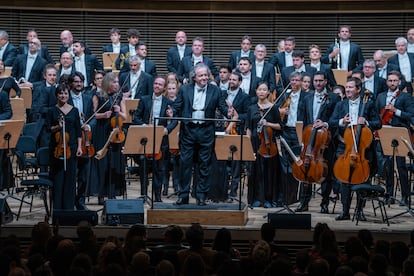Juanjo Mena orchestra director (Vitoria, 59 years old) announces this Friday in a video suffering from Alzheimer’s. “I have directed many scores in my life and the one that touches me now is, sure, the most difficult of all,” he says. The disease is in an incipient phase and, after a year in which it has not reduced its activity, Mena will continue this season with its commitments. “I have a lot of encouragement and a lot of strength to move forward and, above all, an advantage in my favor, music: my passion and the engine that, now more than ever, activates my neurons. Music and my family will become the best therapy, the best treatment to face the future, ”he says. Two great allies to combat that battle and continue as what has been so far: one of the most internationally recognized directors.
If until its generation came, the Spanish batches with projection in the world had had some names that exceptionally and in isolation possessed prestige outside, from those born in the sixties you can talk about a generation of directors with more consolidated careers out of Spain than inside. Mena belongs to that list, as well as Josep Pons, Jaime Martín or later Pablo Heras-Casado and Gustavo Gimeno, among others.
The life of Juanjo Mena and his brother Carlos, also a reference, would have been another if they had not gone to Samaniego school, in Vitoria. There they were lucky to coincide with Antxon Lete, a flute professor who aroused his musical vocation. Both started in choirs and singing. Juanjo also as a contractor. But he decided to leave that free path for his brother and opt for direction.
The Baroque repertoire with the work of contemporary composers combined in Euskadi at the beginning. He had formed in the conservatories of Vitoria and Madrid, along with teachers such as Carmelo Bernola or Enrique García Asensio. Then he became a student of a legend of the management as Sergiu Celebidache, along with whom he learned lessons that we could qualify as mystical in terms of their subject. For example, that the sound is created, feeds, hides … or that music is nothing more than a painting, a color, an inpernsible phenomenon: “represents something untouchable.”
Ángel Colmenares (EFE)
He began to shape his career as a holder in the Bilbao Symphony Orchestra in 1999 and from there began his international career in formations such as Bergen, in Sweden and the Opera de Genoa, podiums that were alternated with those of weight rooms and orchestras of the highest level In Europe and then in the United States, where he debuted with Baltimore’s symphony in 2004. In 2011 he was appointed responsible for the BBC Philarmonic in Manchester and with that experience, being forced to interpret several programs a week, he studied a large amount of repertoire that has made him a versatile and reliable director in several fields. Musicians appreciate it for it and also value that frankness and transparency that applies to work, bluntly.
In 2016, he debuted to the Berlin Philharmonic, something that to date had achieved few Spanish musicians in history, only ATAULF Married and, after Mena, Valencian Gustavo Gimeno. Europe, the United States and Canada have been its main creative spaces, which unites a regular relationship with NHK Symphony Orchestra in Tokyo. In Spain, its regular work continues with the Euskadi or the National Symphony Orchestra, in a relationship that has not ceased in three decades.

